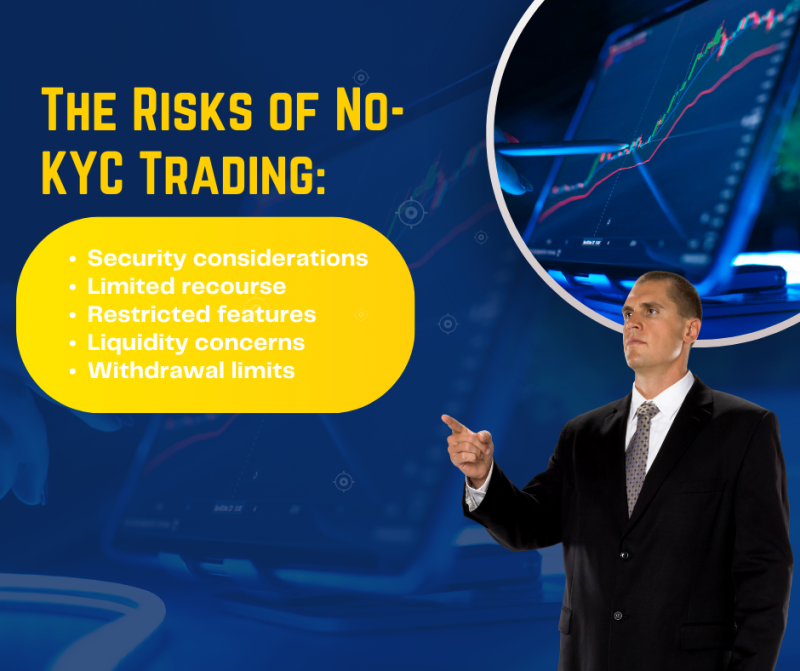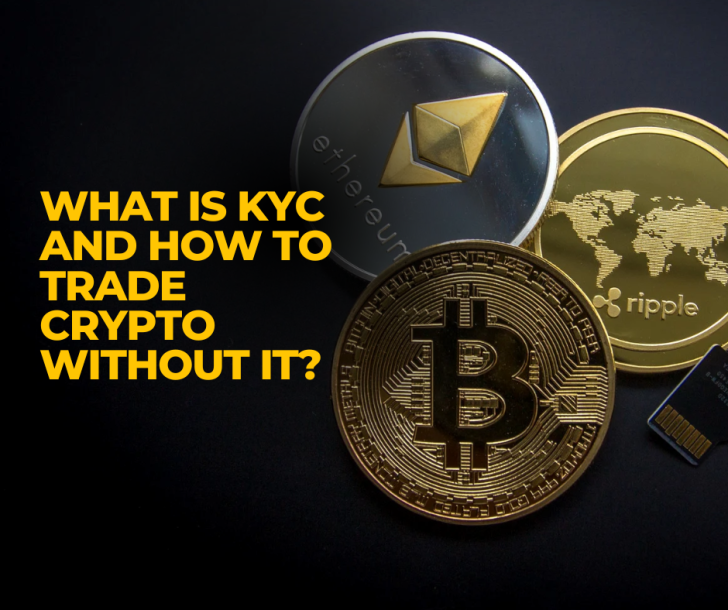The market for cryptocurrencies continues to draw traders who appreciate speedy access to digital assets and privacy. Many people find the conventional verification processes to be an obstacle to admission. This thorough tutorial explains what Know Your Customer implies for cryptocurrency exchanges and offers ways to trade without it.
What Does Know Your Customer Mean in Cryptocurrency Trading?
The legal system known as "Know Your Customer," or KYC, mandates that financial organizations confirm the identity of their customers. These processes usually entail the following when used with Bitcoin exchanges:
- Submission of government-issued identification
- Proof of address documentation
- Facial verification or video calls
- Personal information disclosure.
The purpose of these regulations is to forestall fraud and money laundering. But they also make traders wary of sharing personal information online, which can lead to privacy issues. This extensive use of verification procedures is a result of the fact that the majority of regulated platforms are required to do so in order to operate lawfully in key jurisdictions.
Why Do Some Traders Prefer to Avoid KYC?
Several legitimate reasons exist for why traders search for ways to trade crypto without KYC:
- Privacy protection and data security concerns
- Faster account setup and immediate market access
- Protection against potential data breaches
- Avoidance of identity theft risks
- Philosophical alignment with cryptocurrency's decentralized nature.
While regulated exchanges offer certain protections, they also create central points for data collection that some users find contradictory to crypto's foundational principles. The risk of data breaches remains a valid concern. Several major exchanges have experienced security incidents that compromised user information. This reality pushes privacy-conscious individuals toward platforms with minimal data requirements.
How to Trade Crypto Without KYC: A Step-by-Step Approach
For traders who want to bypass traditional verification requirements, several alternatives exist. The process to trade crypto without KYC follows these essential steps:
| Step | Key Considerations |
| 1. Choose a platform that does not require identity verification | Check community reviews for reliability |
| 2. Sign up with minimal information (usually email only) | Enable additional security features |
| 3. Transfer cryptocurrency from an external wallet | Verify the correct blockchain networks |
| 4. Navigate the exchange interface to make purchases | Start with smaller amounts to test |
| 5. Withdraw to a personal wallet after trading | Double-check cash-out addresses |
Platforms with solid security measures, transparent pricing models, and satisfied users should be your top priorities. Many of these exchanges employ stringent security procedures to safeguard customer cash, even if they may not be fully protected by regulations. Cold storage, multi-signature wallets, and sophisticated encryption technologies are some of the technological precautions that they use to make up for the lack of governmental control.
Still, strong infrastructure alone isn't enough — traders also need the knowledge to make informed decisions within these less-regulated environments. Educational resources prove invaluable for traders who want to protect their privacy while still accessing cryptocurrency markets. Dedicated platforms like WR Trading provide comprehensive materials that help users navigate the complexities of anonymous investing. Their guides cover essential security practices, funding methods, and risk management strategies specific to non-KYC environments, among other things.
Through detailed tutorials, traders can learn how to trade crypto without KYC procedures while maintaining strong security standards. These educational resources emphasize responsible practices that balance privacy with security, including proper wallet management, secure password protocols, and transaction verification methods.
What Are the Risks of No-KYC Trading?
Trading without verification processes does come with certain challenges that traders should understand before proceeding:
- Security considerations: Some no-KYC platforms might implement less rigorous security protocols.
- Limited recourse: Dispute resolution becomes more complicated without identity verification.
- Restricted features: Certain advanced trading options might remain unavailable.
- Liquidity concerns: Smaller exchanges sometimes offer fewer trading pairs or lower volumes.
- Withdrawal limits: Many platforms impose stricter limits on non-verified accounts.
Non-KYC platforms typically operate with different business models than their regulated counterparts. They may generate revenue primarily through trading fees rather than through partnerships with traditional financial institutions. Many of these platforms focus on popular cryptocurrencies like Ethereum, which offers both trading opportunities and utility through its smart contract functionality. This can result in different incentive structures that traders should consider when evaluating platform reliability and long-term viability.

Are There Legal Implications?
The legal status of no-KYC trading varies significantly by jurisdiction. Important points to consider:
- Trading without verification is not inherently illegal in most regions
- Tax obligations still apply to profits regardless of how they were obtained
- Regulatory landscapes continue to evolve worldwide
- Record-keeping remains essential for personal accountability.
Maintaining accurate records of transactions proves particularly important. While the platform might not require identity verification, tax authorities still expect reporting of capital gains in most jurisdictions. Personal record-keeping becomes even more crucial when trading on platforms that provide limited transaction history features.
Best Practices for Secure No-KYC Trading
To maximize security when trading without verification, you should consider the following:
- Use strong, unique passwords for each platform
- Enable two-factor authentication whenever available
- Transfer only the necessary amounts to exchange wallets
- Withdraw to personal wallets after completing trades
- Test platforms with small amounts before larger transfers
- Research platform reputation through community forums.
These security practices help mitigate the additional risks that come with trading on less-regulated platforms. The principle of minimizing exposure applies particularly well here — only keep funds on exchanges when actively trading, and transfer assets to secure personal wallets for longer-term storage.
Finishing Up
For privacy-conscious individuals who want easy access to digital assets, trading cryptocurrency without KYC has benefits. Although there are some trade-offs associated with this strategy, savvy investors can successfully use these platforms by putting appropriate security procedures in place and keeping up with changing market conditions.
 Editorial staff
Editorial staff

 Editorial staff
Editorial staff


